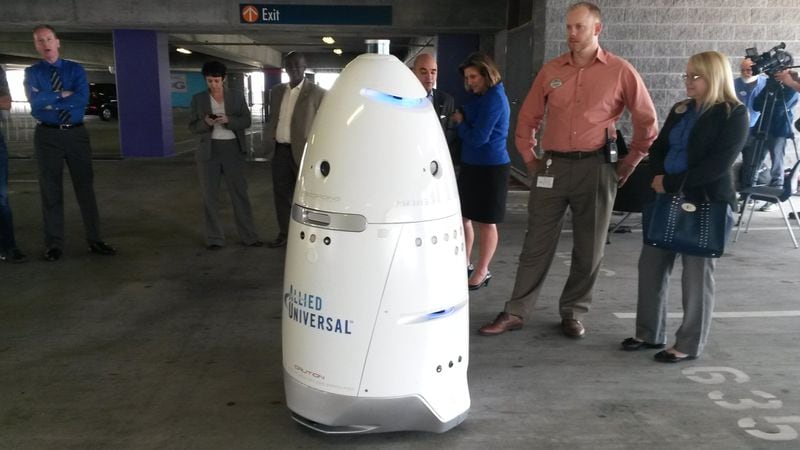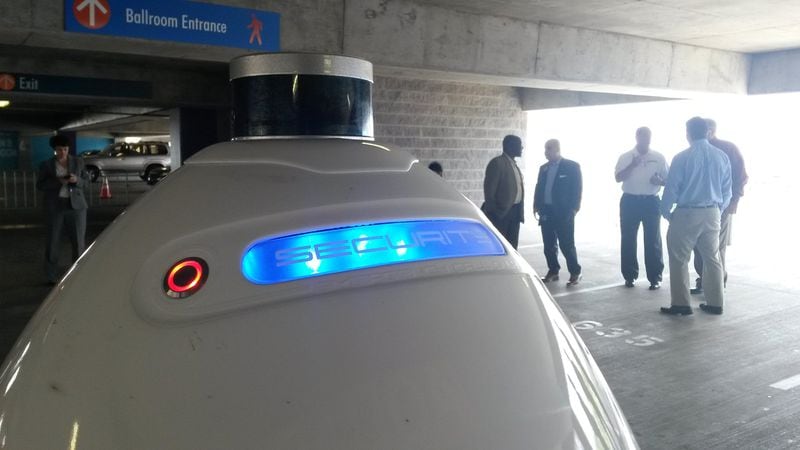The strangest beast at the Georgia Aquarium this summer won't be in a watery tank. Instead, a distant cousin of R2-D2 will be out among us: a robot security guard patrolling the parking garage and perimeter, whirring softly, occasionally giving a sweet little whistle and maybe, eventually, raising questions again about the future of jobs for humans.
Allied Universal, the nation's biggest security services business, is offering to rent the cute rolling creatures to clients. Only about 30 have been deployed in the United States, primarily at shopping malls and offices in California. The first in Georgia would be at the aquarium, an Atlanta tourist attraction with more than 2.4 million visitors a year.
The K5 robot that I put my arm around looked like an upright hard-boiled egg.
It was more than five feet tall and weighed about 300 pounds, but it’s more a tattletale than an enforcer. The robot doesn’t have weapons. It does have four high-definition video cameras, a thermal imaging camera, heat and barometric pressure sensors, oxygen monitors, license plate reading skills and a serious handicap when it comes to navigating stairs.
It also can’t handle gravel roads, elevators or closed doors.
But its California-based maker, Knightscope, gave the wheeled robot the power to spin, travel three miles per hour, navigate assigned routes and brake to avoid hitting gawking kids and business columnists.
The machine also has a red-lighted button to push if you need to call a security guard who breathes. And all the data the bot collects can be gathered and reviewed by a real human back at a security command center.
Which suggests that, for the moment, the robot security guard needs us more than we need him, er, “it.”
The aquarium plans to test the K5 in July or so.
“We are going to see how people react to it,” said Anthony Rivera, the attraction’s vice president of guest experience and hospitality. “The concern is, does it live up to its pitch?”
The robot can increase patrols at all hours, he said, as well as extend video monitoring beyond existing stationary cameras and retain records that might be of use to law enforcement. And maybe some day, he said, an updated robot could roll through the aquarium, answering visitors’ questions, such as “Where is the closest restroom?” and “What is that fish I’m looking at?”
Do robots kill jobs?
But Rivera told me he doesn’t expect robots to eliminate jobs there.
“There is nothing like the human touch,” he said. “History has taught us the personal touch is always the key to delivering a great level of service. It’s something we can never replace.”
I’ve got some doubts. But he told me the aquarium hasn’t reduced the size of its ticketing staff since adding automated ticket kiosk machines a couple years ago.
The aquarium may turn out to be an anomaly if it doesn’t cut positions as it automates.
“The robot can do it 20 times better at half the cost,” Jack Schenk, a Knightscope executive, told potential Atlanta robot customers at a recent gathering.
Among those in attendance was a security representative of a local Fortune 500 company and managers with a company interested in robots patrolling distribution centers and truck lots.
Schenk predicted robots will allow employers to have fewer security workers but pay those they have more for tasks that require greater skill.
“It’s going to have a major impact on how people do physical security moving forward,” he said.
The security field is rich with jobs, if not necessarily pay.
More than 1.1 million people in the U.S. are employed as security guards, with about 29,000 of them in Georgia, according to the federal Bureau of Labor Statistics. Hourly pay nationally averages about $12.39 an hour. (Allied Universal says it’s offering customers use of a robot for what works out to about $11 an hour.)
The industry is grappling with tough issues: low pay, high turnover and downward price pressure from customers.
I'm sure that helps robotics companies making sales pitches within the industry. Besides Knightscope, the players include SMP Robotics, which has been working on an all-terrain version, and Cobalt Robotics, which has focused on an indoor security bot.
Dennis Crowley, a senior vice president with Allied Universal, told me he’s talked to his kids about the rise of robots and the potential to displace jobs.
Scanners and feeds
“Twenty years ago we had security guards at every door checking badges,” he said. Now much of that work is handled by scanners and remote video feeds to a command center.
“It’s inevitable, which every technology industry is doing,” Crowley said. “I’ve told my kids to take computer science and programming courses.”
I’m not so sure those fields will be completely safe either. But flexibility is in order.
Nearly a quarter of a million industrial robots were deployed in the U.S. in 2015, according to the International Federation of Robotics. (The organization, by the way, seems to suggest that robots are good for the job market because they can reduce costs, which can translate into better prices, which can feed increased demand, which can lead to the need for more jobs.)
We’ll see.
A metro Atlanta security supervisor I talked to had his doubts. Robots, he predicted, could help security officers do their jobs (“because we can’t be everywhere”) and could provide priceless data collection. But he questioned whether in a dicey situation a robot would be as much of a deterrent as a uniformed human with a radio and a security vehicle.
Meanwhile, more innovations are on the way on the machine front.
Knightscope is raising funds, in part with hopes that it can add the ability for robots to detect weapons, even concealed ones.
There are no plans, though, to give the robots guns of their own, according to the company.
Related coverage:
Find Matt on Facebook (https://www.facebook.com/mattkempnercolumnist) and Twitter (@MattKempner) or email him at mkempner@ajc.com.
About the Author








